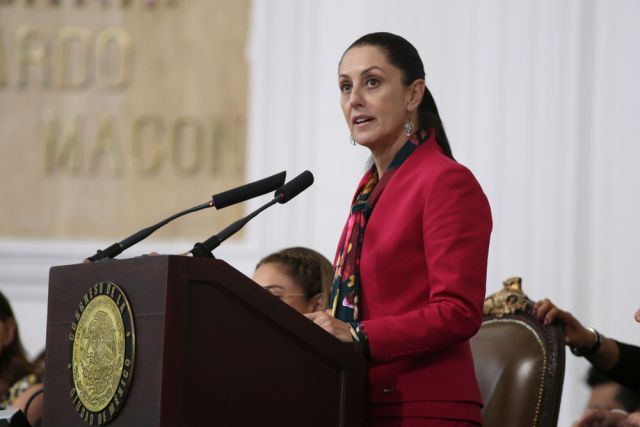
Claudia Sheinbaum, mayor of Mexico City and vying to becoming Mexico’s next president this summer, says she isn’t in favor of an absolute privatization of the energy sector, but isn’t against private investments either. (Source: Shutterstock)
Mexican presidential candidate Claudia Sheinbaum, during an interview with Bloomberg, said the “absolute privatization model” hadn’t worked in Mexico, and if elected president, she would continue to take into account Mexico’s energy sovereignty while keeping the door open to private investments.
“I believe that the absolute privatization model for the energy sector hasn’t produced results anywhere in the world, including in Mexico,” Sheinbaum said during a video interview with Bloomberg on April 20.
“With the energy reform of 2013, Pemex’s debt rose while its production declined,” Sheinbaum said.
Sheinbaum, who is the mayor of Mexico City, is in favor of a new vision for the country and state-owned Petróleos Mexicanos (Pemex), currently under the supervision of Mexico’s President Andrés Manuel López Obrador.
That vision, according to Sheinbaum, implies “clear rules for the national and sovereign development of the Federal Electricity Commission (CFE) and Pemex, as well as investments from private companies where the rules are also clear.”
Mexico City-based Pemex is the world’s most indebted energy company. Its long-term debt was $106.1 billion at year-end 2023.
Sheinbaum said the largest increase in Pemex’s debt occurred during the presidency before Obrador. She said some debt has been reduced but the amount was “still significant.”
Sheinbaum said there was a possibility to refinance Pemex’s debt. But it would have to be associated with the “production of oil, the refining of [petroleum] and the entry of Pemex into other electricity generation schemes, such as cogeneration.”
Sheinbaum said bringing stability to Pemex had to take into account its historical significance as well as a long-term vision of the company under its own energy transition. Pemex has long been a source of operational pride in Mexico, and financially, the company continues to make significant payments to the Mexican government in the form of taxes and duties.
“We need to advance a vision to decarbonize the economy and [determine] at what point we will continue producing petroleum and also [determine] how Pemex will enter into cogeneration, as well as [exploring the] possibility that Pemex assists in the exploitation of lithium,” Sheinbaum said.
Sheinbaum said a major focus of her presidency would be on boosting Mexico’s connectivity as a whole—specifically its ports, roads, freight and passenger railways, as well as internet connectivity, Sheinbaum said.
Sheinbaum said she plans to have a good relationship with whomever is the next U.S. president come Nov. 8.
“We have a very strong economic integration with the U.S.—today we are the U.S.’ main trading partner, and this obligates us to have a good relationship,” Sheinbaum said.
Mexico holds its presidential elections on June 2.
Recommended Reading
Despite Sanctions Russia Still World’s Fourth Largest LNG Exporter
2024-05-23 - Russia ranked as the world’s fourth-largest LNG exporter in 2023, sending out cargoes of 30 mtpa. Russia’s LNG capacity could surpass 74 mtpa capacity by 2030, according to details published by Flex LNG.
Constellation Energy’s Boston LNG Import Terminal Remains Open
2024-06-24 - FERC warned last year that plans to shut Constellation’s Everett LNG terminal could threaten the Northeastern power grid.
Clean Energy Fuels Adds Third LNG Train at California Plant
2024-06-11 - Clean Energy Fuels Corp. said adding a third train to its LNG plant would increase its capacity by 50%, a move an analyst said could reduce the company’s reliance on third-party suppliers and increase annual EBITDA by $2 million.
Texas LNG, EQT Sign a 2-mtpa LNG Tolling Agreement
2024-07-24 - EQT will supply natural gas to Texas LNG, a 4- million tonnes per annum LNG export terminal planned for the Port of Brownsville, Texas.
Sempra, Aramco Sign HOA for Port Arthur LNG Phase 2 Offtake
2024-06-26 - Sempra and Aramco executed a non-binding Heads of Agreement for LNG offtake from Port Arthur LNG Phase 2, while contemplating the Saudi Arabian energy giant to grab a 25% project-level equity in Phase 2.





